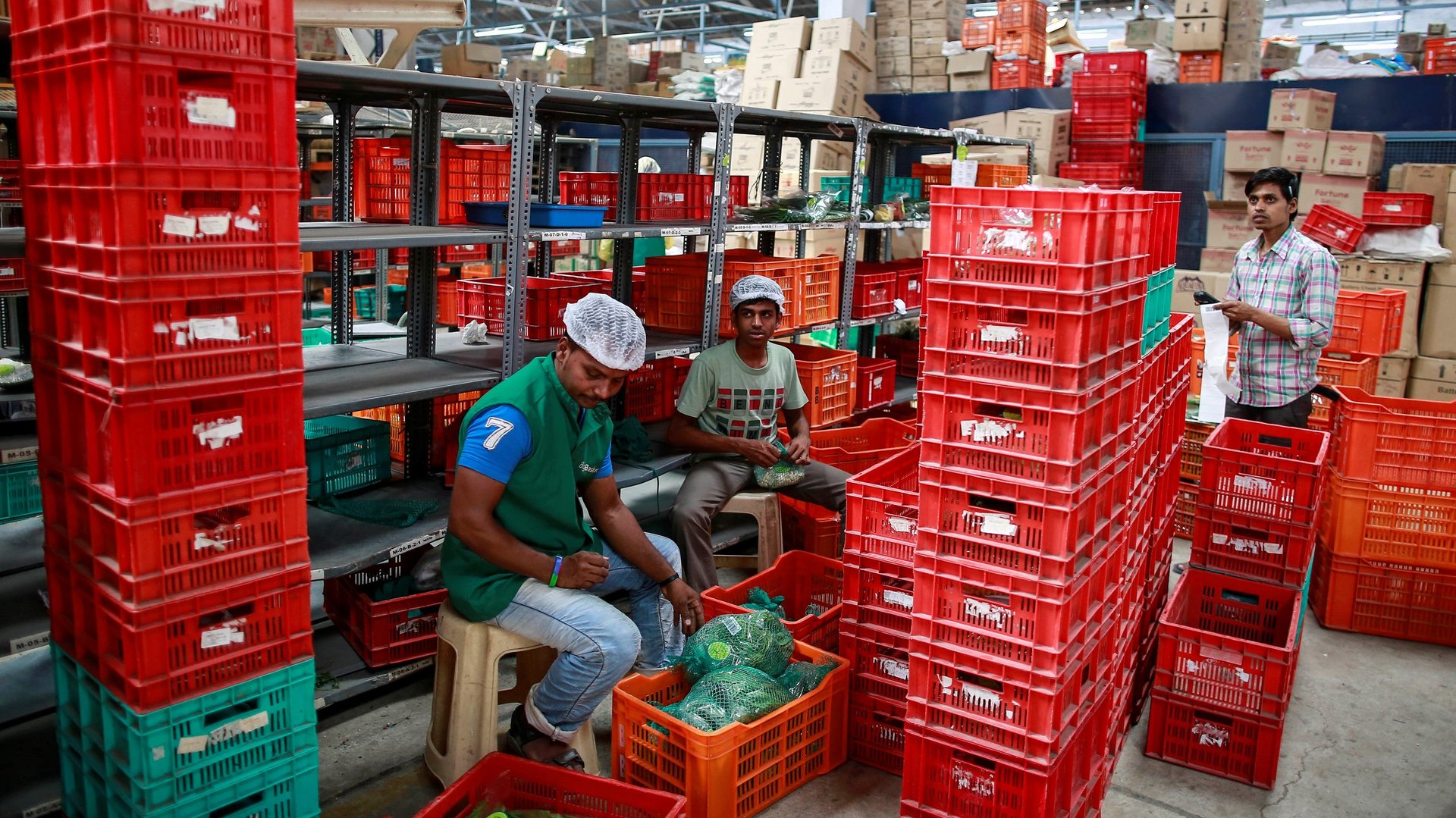How BigBasket managed a 900% spike in orders with only half the staff during India’s lockdown
Online grocer BigBasket is making a comeback after being hit in the initial days of India’s coronavirus lockdown.


Online grocer BigBasket is making a comeback after being hit in the initial days of India’s coronavirus lockdown.
Despite essential goods being exempted, delivery executives were at first harassed by authorities on the roads, triggering an exodus to their homes in the villages. With a truncated workforce, operations at BigBasket came to a standstill.
Yet, the technology-savvy company was quick to optimise resources and leverage its huge infrastructure investment to restart operations. Down to a few thousand orders in early days of the lockdown, the e-grocer managed to scale up operations despite manpower shortage, explained its co-founder & CEO Hari Menon at a webinar on “Food & Beverage Startups—Striving & Thriving in the Covid-19 world” yesterday (April 23).
Here’s what he said at the event organised by Fireside Ventures and TiE Delhi, a non-profit venture devoted to entrepreneurs:
The crisis
The “Janata Curfew” (a one-day lockdown in India) was announced on March 22. The day before, we, at BigBasket, had all local permissions to operate. However, due to confusion on the ground, we were asked (by local authorities) to shut down warehouses, etc.
All of this created panic and confusion among our workforce.
A lot of employees left us on seeing what happened to their colleagues (harassment at the hands of police). With most of our migrant workers leaving for their hometowns, our operational capacity was reduced to 50%. The single-biggest issue that hit us was a shortage of staff. We had to switch completely to essentials.
From a listing of 32,000 stock keeping units (SKUs) on our platform, we came down to 3,500 SKUs. With the lockdown in place, we were down to 30,000 orders a day from 150,000 orders in usual business days. With our daily delivery service, bbdaily, we have even done 250,000 orders on a (normal business) day.
The rebound
In the last two to three years we have invested in developing infrastructure capabilities and building our supply chain and warehouse network.
This proved to be useful during the lockdown. We had no issues on the supply-side with our farmer partners, mills, and fast-moving consumer goods (FMCG) companies. Our supply chain has been strong. We have now scaled up to 300,000 orders (per day).
I think customers criticising us for non-delivery and delays is unfair. Scaling up from 30,000 orders to 300,000 took the life out of us. We had 57 partnerships at one time to get more people and carry on the operations. We partnered with the National Restaurant Association of India, Uber, etc to make sure we could ramp up operations with more people.
Every morning we set capacity (delivery targets) based on the number of people reporting to work. Running operations was that dynamic. Demand surge was 5X or 6X of regular orders. Slots were shutting in 15 minutes.
More is less
With our limited workforce, we carried out a lot of tweaks and automation. With all the changes we saw our productivity go up by 23%. We realised we could deliver that many more orders with lesser number of people.
We started by saying how do we get more people to utilise one slot. So we started getting people to buy together. We encouraged neighbours to accumulate orders and place the same on WhatsApp or call us.
The team quickly introduced community selling and asked apartment complexes to put orders together for their residents. This helped in last-mile delivery optimisation. Earlier, our people would visit an apartment to make deliveries three to four times in the same locality/apartment. Now they go for deliveries three times a week.
We optimised resources like crazy. We further rationalised our SKUs in cities where there was an acute shortage of manpower. After initial challenges, the government support helped in scaling up operations and overcoming obstacles (easy movement of delivery boys, etc) on the ground. Business process re-engineering has been the key for us to deliver and increase productivity during the lockdown.
Post Covid-19 scenario
The government is not allowing the movement of people across borders yet. But you can only hire that many people from a city.
So far, we have managed our operations with limited assortment. But when we go back to 38,000 SKUs then we will need to figure out how to manage that with a limited workforce. The moment you put a larger range of products out there, it puts pressure on distribution centres. At some point, we will scale up.
Our accelerator programme—the BB Accelerate has served as a launchpad for new brands. The BB Accelerate team is eager to work again with emerging food brands. We are talking to a lot of potential new startups and we will soon get young emerging brands back on the BigBasket platform.
Consumers will shop more online. As we go along, a lot of things will settle down quickly. I’m not too worried.
We need to get more people on board. Until and unless borders open for migrant workers to come back to cities and work it will hold us back from getting new products, listing more SKUs, and scaling up.
We understand the government has concerns in bringing migrant workers back. But even if the government opens up lockdown restrictions in a controlled manner it will help us a lot. Grocery globally has never been a one or two-player business. It is a multibillion-dollar industry and there is space for more players.